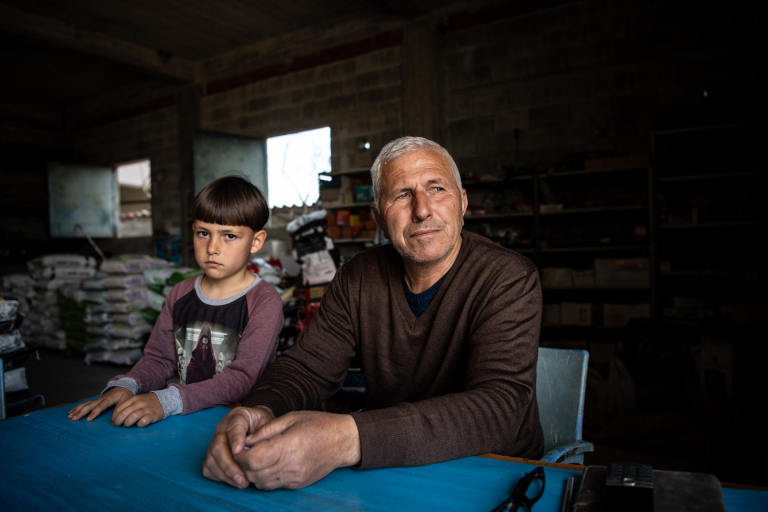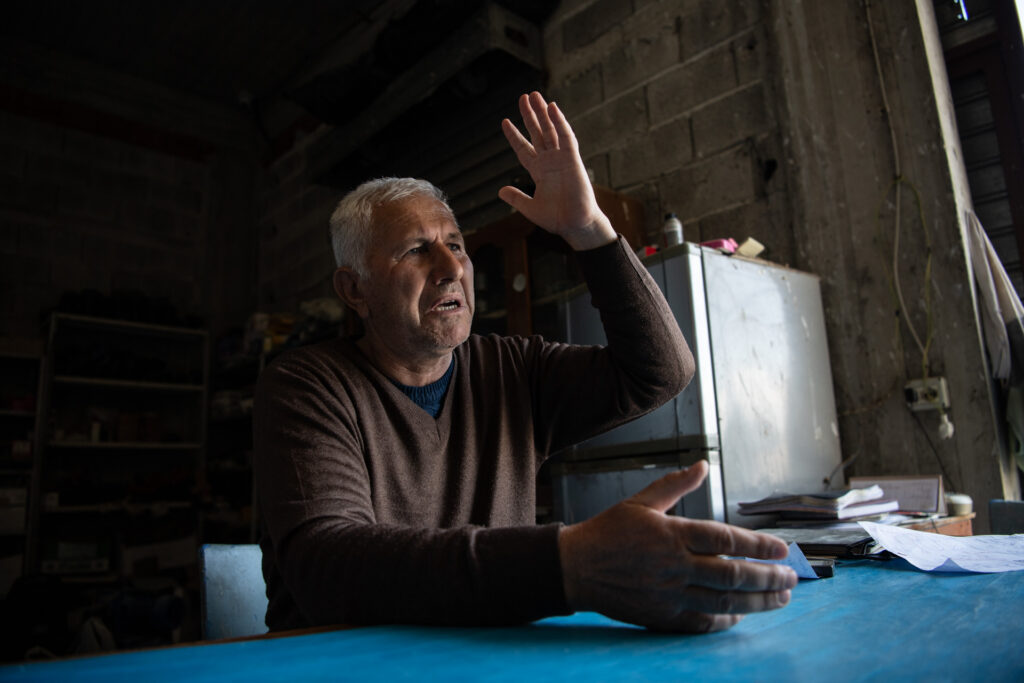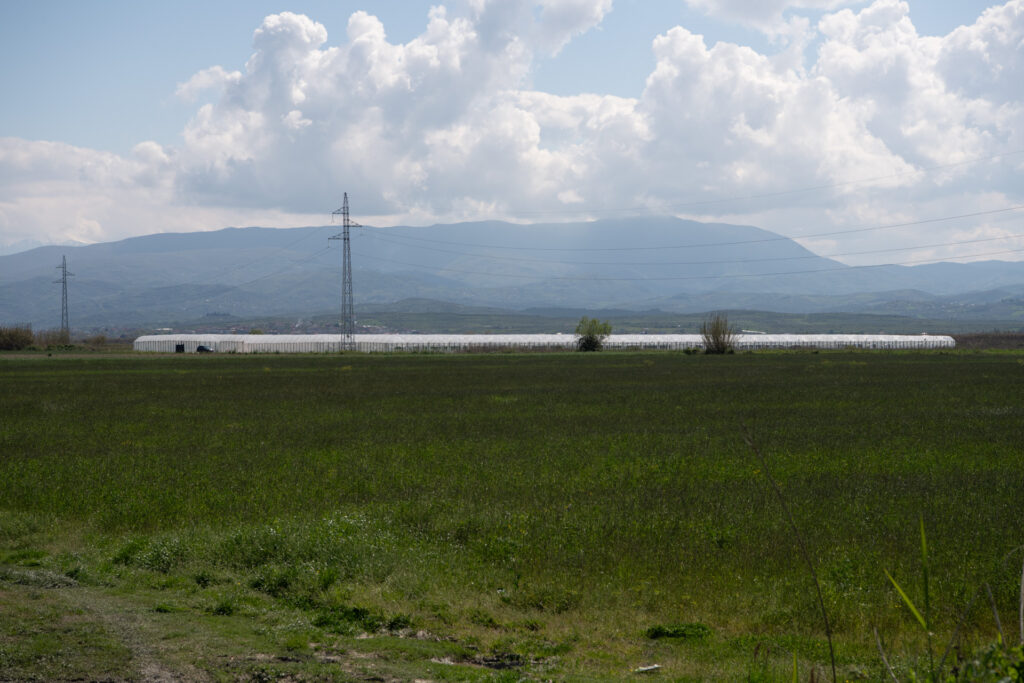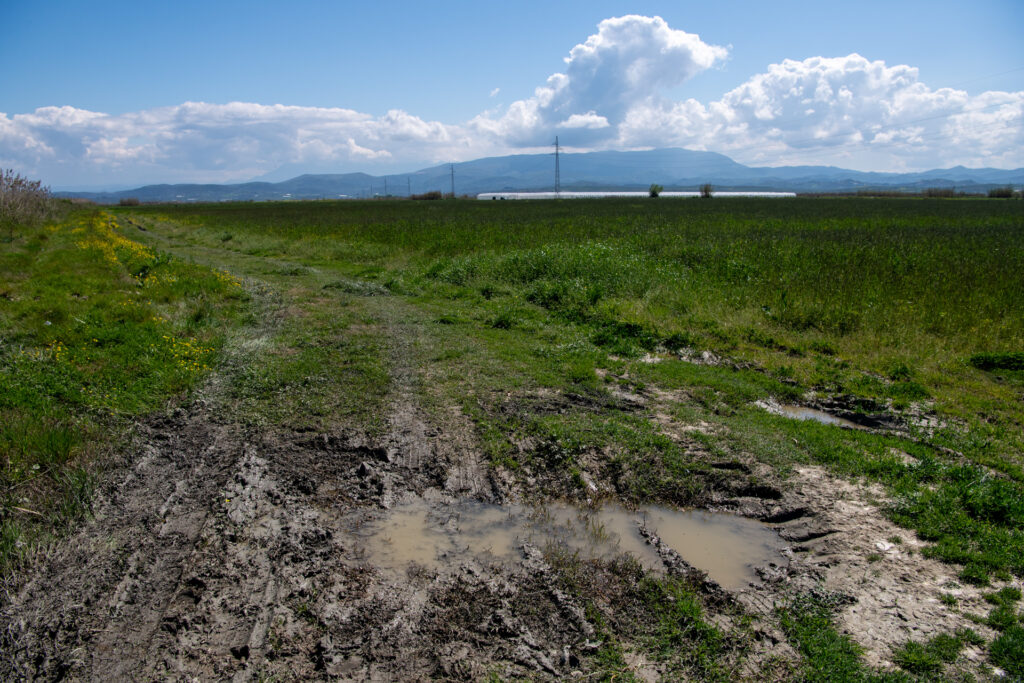
Esmeralda Topi
What would you think if you had 200 hectares of greenhouses growing tomatoes, strawberries, and cucumbers, and one day you were informed that a gas power plant would be built near your village?
In Roskovec, this is not a hypothetical situation. It is a harsh reality that threatens not only agricultural land but also the future. This is the story of a rural area with over 6,000 people who live off the land and may soon have to live with its pollution.
In the village of Suk 1, where agriculture and livestock are the heart of the local economy, the government has approved the construction of a natural gas power plant. The 170 MW project has met strong opposition from local residents, experts, and environmental organizations.

Photograph by Atdhe Mulla
‘We’ve built this life with hard work and sweat’, says Tofik Metushi, 68, as he looks out over the greenhouses that fill the horizon, even near the spot where the power plant is planned to be built.

The site where the power plant will be built, Suk 1 village (Photograph by Atdhe Mulla)
Tofik doesn’t speak as an activist. He speaks as a man who has personally cultivated every meter of land he owns, and today, he asks with a trembling voice:
‘Who will buy our products tomorrow when the village’s name is associated with gas and pollution?’
The past has taught him a lesson: ‘If you said you were from Marinza, no one would buy your dairy. If the power plant is built, everything is over.’
He is not alone. Hundreds of residents from surrounding villages near Roskovec have protested, collected signatures, and turned to the courts to prevent the construction of the power plant.
‘Even if they tear down my house, just don’t build that. It’s a catastrophe for us,’ says Tofik with a shaking voice.
But their voices have fallen on deaf ears. Their protest has faced a system that moves forward, even when the whole area is shouting: ‘Stop!’
A slip of the tongue that burns the land
The government’s decision, made last December, refers to the plant as ‘photovoltaic’. A Freudian slip to be archived, as the power plant will be powered by natural gas. The plant will be supplied by the Trans-Adriatic Pipeline (TAP) and will be operated by a private entity for a 49-year period.
‘It’s a project developed by a private entity, which will engage in the production of electricity from a thermal plant, the output of which will be privately marketed by the developer’, explains the Ministry of Infrastructure and Energy in response to Faktoje.al.

The site where the power plant will be built, Suk 1 village (Photograph by Atdhe Mulla)
The power plant will be constructed by the company ‘FIER THERMOELECTRIC’ S.A., a partnership between Albanian and Greek companies. 30% of the shares belong to the Albanian company ‘Gener 2,’ while 70% are divided between the Greek companies ‘GEK TERNA S.A.’ and ‘DEPA Commercial S.A.,’ the Public Gas Corporation of Greece. This project is not a standard concession. In return, the state will receive 2% of the annual production as a ‘royalty’, while the private company is obligated to sell a portion of the energy to the public distributor.
Environment in theory, pollution in practice
The Environmental Impact Assessment report was prepared by a company contracted by the investor. Environmental experts highlight clear instances of data manipulation, with pollution being carefully masked by appealing figures.
’75 times less pollution than reality, to claim we are within the standard’, says Gjergj Simaku, an energy expert and former deputy minister.
Lavdosh Feruni, from the Movement for Energy and Climate, stresses that the emissions will be much higher than those reported on paper.
‘For 3,500 hours of operation annually, the power plant will release over 240,000 tons of CO2, and if it operates at full capacity, over 590,000 tons’, calculates Feruni.
Instead of clean energy, Albania will be hit by a ‘climate disaster’, according to Simaku. He argues that this project is not intended to benefit Albania, but to help Greece meet its decarbonization goals.
‘The Roskovec project is part of a strategy to build power plants on Albanian soil to fulfill Greece’s decarbonization needs. The same government won an arbitration case against the Korça power plant for environmental pollution. Why approve this project?’ Simaku questions.
While Brussels is paying attention, Tirana seems unwilling to listen
The European Commission has raised concerns about the approval process for this project. In a statement to Faktoje.al, Brussels reminded Albania that as a candidate country, it should conduct proper scientific impact assessments and ensure public participation.
In short: don’t secretly build a power plant in one of the country’s most agriculturally significant regions.
‘Publicly funded commitments in Albania, including support from the WBIF, prioritize solar energy, wind power, rehabilitating existing hydropower plants, and improving transmission lines’, an EU spokesperson emphasized.
Meanwhile, the National Energy and Climate Plan speaks about solar, wind, and hydro improvements, but on the ground, the focus is on gas, and institutional silence prevails.
‘A photovoltaic investment alternative would have lower costs, smaller environmental impact, and would contribute to meeting the EU’s Clean Energy and Climate Directive’, suggests Eduard Gjokutaj, an energy expert.
‘This is a climate blow for Albania, not Greece. Because we are not yet a member, but we are aiming for 2027 and have obligations to meet. This is the moral of the story’, concludes Simaku.
***
On February 27, 2025, the National Council of Territorial Planning approved the construction of the power plant in Suk 1. Everything is now formalized on paper, clearing the way for the project. Yet, the resistance continues. Hope, like the seedlings in the greenhouses of Roskovec, is still alive.
‘I believe it won’t happen’ whispers Tofiku, with the voice of a man who has seen much but has never seen justice come with gas.





